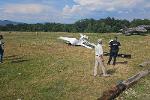Belgian-born Marc Desenfans, who came at the helm of Unilever's domestic subsidiary four months ago, says he is considering opportunities to enter new market segments in Romania and still expects to see profit in 2009.
Unilever consumer goods producer plans to boost exports from the plant in Ploiesti, so that in the following years the Romanian market may contribute just 50% to the turnover of South-Central Europe (USCE), from 75% at present.
The Bucharest offices coordinate Unilever's operations on eight Balkan markets, which last year generated turnover close to 192m euros.
"Romania still has the advantage of low costs, as a production location. Our objective is to boost economies of scale in Ploiesti plant," says De senfans.
In the past five years, the company has doubled its domestic production capacity and meanwhile USCE sales have risen by 70%. In the next five years, Desenfans wants to balance out turnovers generated by USCE.
He maintains the Ploiesti production platform is seen by the rest of the company's subsidiaries as one of the most efficient in CEE.
This year's export deliveries increase was also made possible by the relocation of two margarine production lines from Czech Republic after an Unilever plant was closed there, to Ploiesti.
The producer's representatives specified 18 jobs would be thus created in Ploiesti.
Desenfans says the weight of foreign markets in the business will be raised also because of the stepped-up marketing efforts in countries such as Serbia, Bulgaria or the Republic of Moldova.
The producer has recently rented over 30,000 square metres of storage space in Ploiesti West Park project, being the first tenant of the new logistic park of Prahova. The investment entails the creation of a regional distribution centre by transferring operations from four warehouses to one. @N








